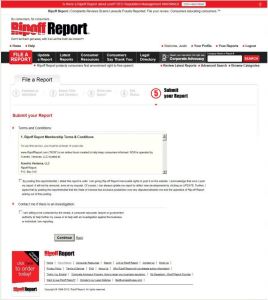First Circuit Rejects Copyright Workaround to Section 230–Small Justice v. Ripoff Report
[It’s impossible to blog about Section 230 without reminding you that it remains highly imperiled.]
Goren runs a law firm, Small Justice. DuPont, a defendant in a case Goren brought, posted two negative reviews about Goren to Ripoff Report. Goren sued DuPont, who no-showed, resulting in default judgment. The state court awarded DuPont’s copyright in the two reviews to Goren. Goren then asserted the copyright against Ripoff Report. We have been covering this case for years (since 2013!). My blog post on Goren’s initial complaint. Venkat’s post on the initial district court ruling. My post on a subsequent district court ruling.
On appeal, the First Circuit sides completely with Ripoff Report. Barring an ill-advised appeal to the Supreme Court, this case should be over.
Section 230. Section 230 wipes out Goren’s defamation, intentional interference and (parts of) unfair competition claims based on DuPont’s negative reviews. Goren argued that Ripoff Report partially developed DuPont’s posts (using tired arguments like Ripoff Report had copyright interests in the reviews, an argument that first failed in the Blumenthal v. Drudge case 20 years ago). The court disagrees because “Xcentric did not alter the content of the information DuPont posted.” Furthermore, Ripoff Report’s efforts to get DuPont’s content indexed in the search engine did not “specifically encourage” DuPont’s content (cites to Kimzey v. Yelp, Ascentive v. Opinion Corp. and Ayyadurai v. Techdirt). Curiously, while the First Circuit discusses its powerful UCS v. Lycos opinion from 2007, there’s no mention of its even more powerful Section 230 ruling in the Doe v. Backpage case from last year.
Copyright. Ripoff Report claims that DuPont granted it an irrevocable nonexclusive license, so Goren never had the right to terminate the license or claim Ripoff Report was infringing. Goren argued that DuPont received no consideration for the license. The court says that Ripoff Report performed its end of the bargain by publishing DuPont’s reviews, mooting any consideration concerns. Goren also argued that Ripoff Report’s contract was void for public policy because it implicitly promised never to remove posts that were defamatory. The court says that argument is irrelevant to the DuPont-Ripoff Report copyright license.
Unfair Competition. Part of the unfair competition claim, predicated on Ripoff Report’s Corporate Advocacy Program and pay-to-play arbitration program, wasn’t preempted by Section 230. It still fails because Goren couldn’t show how Ripoff Report’s allegedly unfair programs motivated DuPont’s submission.
Attorneys’ Fees. The appeals court upholds the district court’s award of attorneys’ fees and costs pursuant to copyright’s fee-shifting statute (17 USC 505) to the tune of over $120,000. That’s a lot of money….er, close to the cost of a law degree. In a sense, Goren will have paid for his legal education twice.
Implications
This litigation raised numerous interesting issues that the appellate ruling didn’t address, including whether the state court had the legal power to award copyright ownership to Goren in the first place (I think no), whether Ripoff Report had acquired more than just a nonexclusive license to its users’ posts, the problems that Ripoff Report created for itself by not having a proper call-to-action on its user agreement (it got bailed out by a layered notice), and much more. I’d say that perhaps those issues will be resolved in other cases, but I’m hoping no future case like this ever emerges!
Even among the many cases we’ve blogged, this case stands out as particularly noteworthy because it exposes an ugly interface between copyright and reputation management. Goren didn’t want copyright ownership to “promote the progress of science.” Like the doctors in Medical Justice’s decrepit program to pre-acquire the copyrights to unwritten reviews of their patients, the real goal of copyright ownership was to suppress the content. To me, this turns copyright law on its head, by making our society dumber, not smarter. Jessica Silbey and I are co-authoring a paper on how and why copyright has emerged as a reputation management tool of choice, and the paper prominently features this case as an example. The fact that the appeals court reached a satisfying outcome is nice. However, the fact it took four years of litigation to reach this result, when most defendants would have given up long ago, is symptomatic of copyright law’s overreach. We need to build industrial-grade doctrines in copyright law to prevent its misuse as a reputation management tool.
Case citation: Small Justice LLC v. Xcentric Ventures LLC, 2017 WL 4534395 (1st Cir. Oct. 11, 2017)


Pingback: Not What Copyright Is For | Property, intangible®()